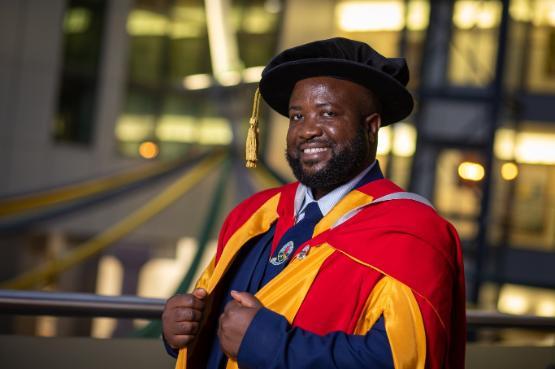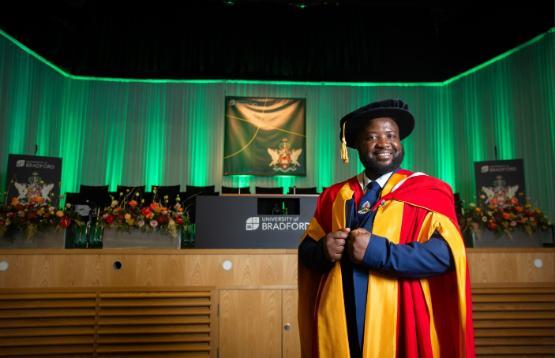University of Bradford honours an influential archaeologist
A family tradition of meeting under a ritual tree said to record conversations sparked Elgidius Edgar Bwinabona Ichumbaki’s lifelong interest in archaeology and how we can preserve our heritage. His research career has taken him all over the world, and this week to the University of Bradford to collect an Honorary Doctorate.

Born into a very large family in Muleba in the Kagera region in Northwest Tanzania, Africa, Elgidius Edgar Bwinabona Ichumbaki grew up in a polygamous family. With seven wives and 38 children, his father kept the peace with regular family meetings, where all family members would gather under a tree to air grievances and come to agreements. Ichumbaki says: “This was a way of holding everyone accountable, but it also got me interested in heritage and preserving stories.”

After excelling in primary school, Ichumbaki faced limited options to continue his education as he did not get a place at one of the few Government boarding schools, and expensive private secondary schools. At the age of 15, he sold local beer and gin at a bar set up by his mother to support the family.
In 1999, Ichumbaki’s luck changed as he was offered a scholarship to attend secondary school, where he balanced work and studies and worked hard to catch up. This led him to a Bachelor’s degree in Culture and Heritage at the University of Dar es Salaam (UDSM) in Tanzania, allowing him to learn more about his family and community’s culture.
An international research career
Soon after finishing his Bachelor’s degree, Ichumbaki joined 25 young people from across the world to travel to Canada to learn about the sustainable management of UNESCO World Heritage sites. Here, he gained hands-on experience about protecting heritage of global importance and brought this knowledge back to Tanzania where he completed his Master’s, followed by a PhD working across Tanzania and Denmark.
While working at UDSM, Ichumbaki came across the University of Bradford’s leading work to digitise heritage sites. He first visited Bradford in 2018, and again in 2021, giving talks to staff and students, and supporting eight students from Tanzania to visit Bradford for almost three months to advance their careers. He began exploring the University of Bradford’s archaeology and heritage work and how this can be applied in Tanzania.
A new way of communicating science and preserving heritage
Thanks to Ichumbaki’s work and influence, Tanzania has seen a dramatic change in methods of preserving heritage. Previously, preservation involved paperwork or computer entries. But through his collaborations with the University of Bradford, Ichumbaki has introduced more complex 3D visualisations, and better ways to document and share history.
Ichumbaki feels it’s really important to find ways to preserve his country’s historic sites, particularly those that are in danger of being lost forever due to development pressures and climate change. This includes the historic town Bagamoyo, a 19th Century slave trade colonial city, where more than half of monuments have been corrupted. He was instrumental in digitising and creating copies of these monuments.
He said: “We can’t know where we are heading unless we know where we are coming from. To plan for our future, we must know our past very well. This means we need evidence of what these sites looked like, and how they deteriorated over the decades.”
His work helps to protect sites before they disappear, and to raise awareness, giving future generations the opportunity to learn. Now a Professor at UDSM, Ichumbaki is excited to be sharing this work with his current students, who are taking the technology a step further by working to develop a mobile app so that anyone can take photographs of artefacts to help with the digital mapping of sites.
Sharing heritage with local communities
Local communities have been an inspiration to Ichumbaki, from those in his village who contributed so that he could complete his A-Levels, to the communities who have accommodated him and collaborated to allow him to study important sites.
Ichumbaki is passionate about communicating the value of heritage to wider audiences, especially to these local communities unable to access academic publications and scientific reports. Frustrated that academic articles, papers and books have limited reach and impact, he started creating songs and music videos in the local language of Kiswahili to engage local communities with heritage sites. These have been very successful, with some videos reaching almost 100,000 views on YouTube.
For graduates and university staff, Ichumbaki advises that we never stop learning.
“Recognise that there will always be others with more knowledge, who we can learn from,” he urges.
He says this is especially true in the academic world, where those from developed countries must not under-estimate and must listen to the voices of those in developing countries where they conduct fieldwork.
